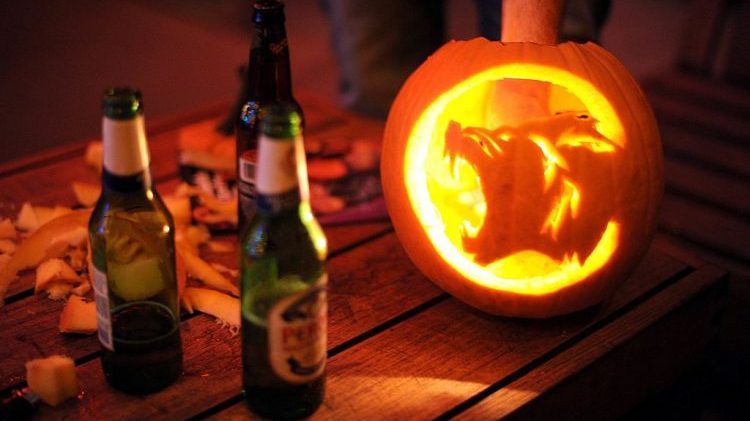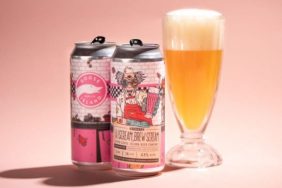Photo: TIM SLOAN/AFP/Getty Images
Every year, as the seasons change from summer to fall, just like the leaves, we begin to see beer shelves shift from light to dark. Instead of IPAs and wheat beers, we see Oktoberfest-style beer displays and the controversial pumpkin beer. In the world of brews, it seems most of us enjoy the Märzen-style beers that fall under the Oktoberfest category. Yet we’re divided on pumpkin ale. Is is great? Does it suck? Why do we have such a love/hate relationship with this seasonal beer style?
“It’s true, pumpkin ales sometimes get a bad rap, which is unfortunate because they can be just as complex, if not more, in their flavor profiles as other varieties,” says Matt McCall, head brewer at Coney Island Brewery. The brewery, like many, has its own pumpkin-based seasonal. “Our Freaktoberfest Big Ol’ Pumpkin Ale and Super Freak are two of those hauntingly complex pumpkin beers, which happen to be made with Brooklyn’s own Café Grumpy coffee blends.”
Pumpkin Beer Has Its Charms
For fans of pumpkin beer, it’s all about flavor and mouthfeel. “Particularly, pumpkin adds a creamy texture and distinct taste,” says McCall. Pumpkin can add a lot of complexity, especially when next to complementary spices like nutmeg and allspice. “As a classically-trained chef, I am constantly thinking about flavor combinations among spice, like the Tarot Gone Gose we had a couple months ago, a sour Gose made with sea salt, coriander, lemon peel, and of course, tarragon. Lemon peel also goes into our Super Freak, giving it a nice invigorating element to cut through some of that creaminess.”
Pumpkin Beer Haters Unite
According to Elysian Brewing’s Head Brewer Josh Waldman, pumpkin beers are so divisive for two reasons. First: pumpkin and spice are non-traditional brewing ingredients. Second: the category has been heavily co-opted.
When Beer Met Coffee: Harpoon And Dunkin’ Release Espresso Spiked Beer
“Some drinkers find non-traditional ingredients (i.e. anything beyond malt, hops, yeast, and water) to be a crutch for brewing, and there’s some historical basis for this in the U.S.,” says Waldman. “That said, many historical styles use non-traditional ingredients and processes to great effect — think lambics, Berliner Weisses, and more.”
https://www.instagram.com/p/Bn7L16QBXhT/?taken-by=elysianbrewing
As for cooptation, craft beer consumers personalize and internalize their drinking choices. “If breweries appeal to the mainstream by pumpkin spicing something, hardcore (and maybe less tolerant) consumers see it as a snub, a mass appeal,” says Waldman. “It can be toxic in extreme, though I appreciate the connection that a brewer can have to a consumer though they’ve never met.”
Don’t Knock It ‘Til You’ve Tried It
One of the biggest problems with pumpkin-based beers is the assumption that drinkers won’t like them before they even try them. As with any new experience, you should keep your mind open to all flavors and let your mouth do the tasting instead of your preconceptions.
But sometimes your assumptions are right. “It’s fun for me to be surprised by something I wasn’t expecting,” says Jeremy Allen, general manager and head bartender at MiniBar in Los Angeles. “In this case, the real surprise was how accurate my preconceptions were, and how each and every nasty pumpkin beer I tasted confirmed those entirely unfair preconceptions.” The best compliments he can muster are “swallow-able” and “can’t really taste the pumpkin too much.” This doesn’t mean that just because some people have a distaste for pumpkin beers, the same will be true for you.
Even though he dislikes most pumpkin beers, Allen does have one he doesn’t completely hate. “The least-worst one I have tried, Kern River Brewing Company Pumpkin Ale, doesn’t really taste good or bad, with kind of a bitter finish.” If he didn’t know it was pumpkin, he might not have guessed. “So, it seems I’m missing the point on this one. It comes in a 22-ounce bottle, which means you have about 21 ounces to pour out for the lost souls that only come around at Halloween.”
“I’m always into seasonal expressions, but this one takes it a bit too far,” says Ben Rouse, bar lead at Henley in Nashville. “I have had a few pumpkin ales that are drinkable, and while I appreciate them for what they are, it’s not my preference. I tend more toward classic Oktoberfest beers for fall.”
Beer And Pancakes: IHOP Releases Pumpkin Pancake Beer
Why Is Pumpkin Beer An Unpopular Brew?
“I think it’s because of the overabundance of items that take on the pumpkin flavor for fall,” says Rouse. While he enjoys pumpkins on their own, he believes there are other fall flavors that deserve more attention. “I also believe that we tend to think ‘pumpkin spice’ when it comes to these style beers, and that starts a whole different conversation,” he says.
People like to feel superior, and the pumpkin spice thing is an easy target for the snob. “Also, people hate winter, and this is a reminder to the rest of the country that ‘winter is coming,'” says Allen.
Pumpkin beers usually have a malty, rich flavor that works well with spice notes and bitterness. “It also covers a wide variety of flavor profiles, as it can be savory or sweet, and we are seeing craft beers play to both sides of the palate in these regards,” says Rouse. Allen has a more opinionated take: “Most are heavy-handed, like a chai latte if a chai latte was the worst thing you could ever put in your mouth. By the way, I don’t love squash either.”
All in all, whether or not you enjoy pumpkin beers is based on your taste buds. Obviously, a lot of drinkers enjoy the style as breweries all over the country release pumpkin-based seasonals every fall. Your best bet is to visit your local brewery, grocery store, or bodega and grab a six-pack of a pumpkin-based beer that looks appealing to you. Crack a bottle open and make up your own mind.









